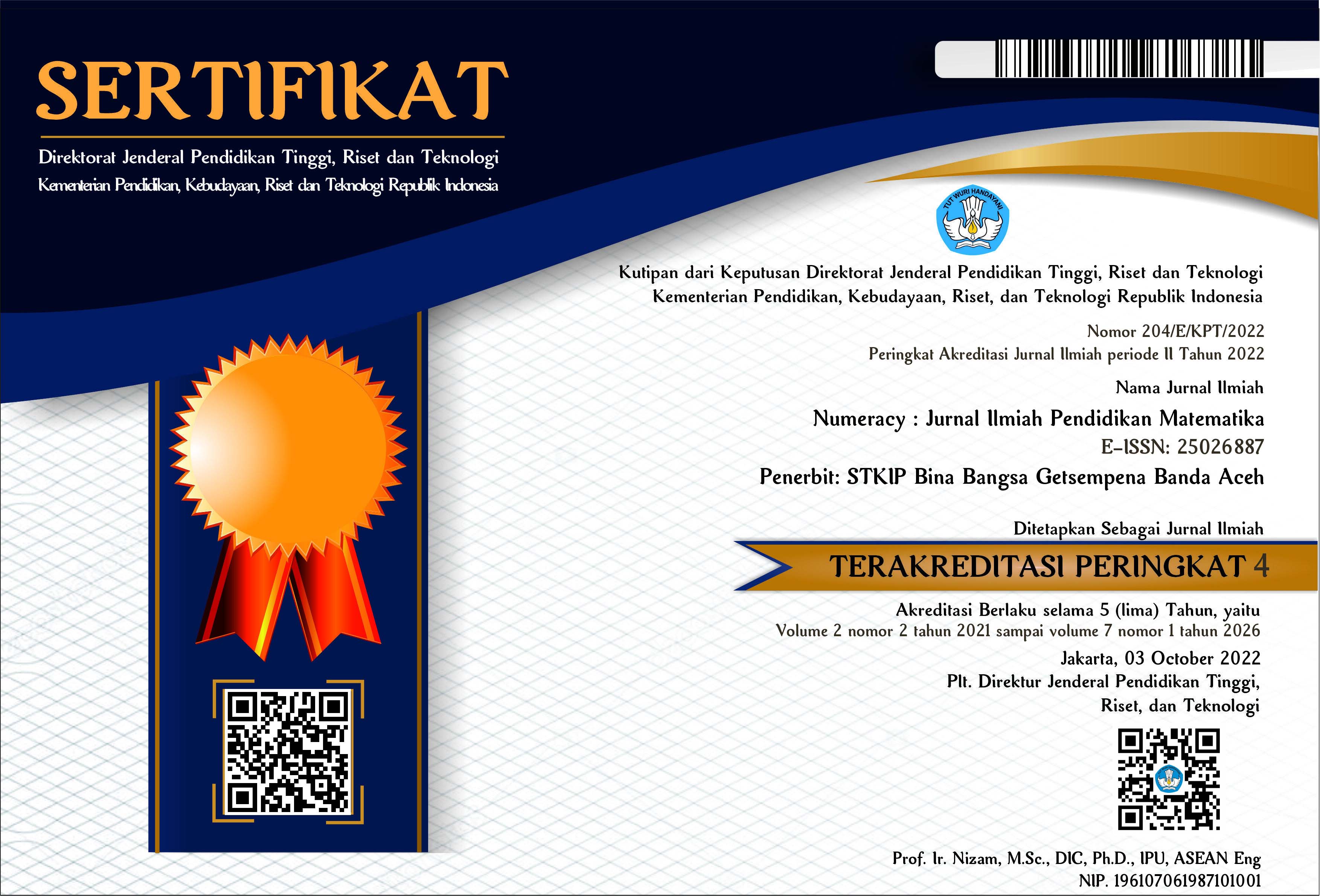PENERAPAN PENDEKATAN PROBLEM POSSING DALAM UPAYA MENINGKATKAN SELF CONFIDANCE CALON GURU MATEMATIKA UNIVERSITAS SAMUDRA
Abstract
The teachers candidates are people being prepared into a teacher. Although the teacher candidates has been equipped with various science teacher and a set of teacher skills, it is possible they still have less confidence in the ability that has been owned, especially self confidence. This study aims to find out how to improve self-confidence of teachers candidates and learning outcomes in understanding mathematics through the application of problem posing approach. This research uses eksperiment research with quantitative approach. The main data in this research are test result of learning, observation result of student activity, and questionnaire to student of mathematics education program. subject peneliannya is a student of mathematics education semester four. The results show that there is an increase in self confidance and understanding of mathematical concepts of prospective teachers through approach possing problems are applied by forming small groups consisting of two to three; guiding teachers candidates to create a conducive learning; providing motivation; assigning tasks at the end of each lesson; asking one of the teachers candidates to present their tasks, every teacher candidates is required to make a problem / issue and the answer which will then be given to his friends to solve it, and provide exercises or quizzes at the beginning of the lesson or at the end of each learning session. Every aspect of Self Confidance has increased, and overall average aspect improvement is 42.3%.
Abstrak
Calon guru adalah orang sedang dipersiapkan menjadi seorang guru. Walaupun calon guru tersebut telah dibekali berbagai ilmu keguruan dan seperangkat keterampilan keguruan, tidak tertutup kemungkinan mereka masih memiliki kepercayaan diri yang kurang terhadap kemampuan yang telah dimiliki khususnya kepercayaan diri (self-confidence). Penelitian ini bertujuan untuk mengetahui bagaimana cara meningkatkan kepercayaan diri calon guru dan hasil belajar matematika melalui penerapan pendekatan problem posing. Penelitian ini menggunakan penelitian eksperimen dengan pendekatan kuantitatif. Data utama dalam penelitian ini berupa tes hasil belajar, hasil observasi aktivitas mahasiswa, dan angket terhadap mahasiswa prodi pendidikan matematika. subjek peneliannya adalah mahasiswa Pendidikan matematika semester 4. Hasil penelitian menunjukkan bahwa ada peningkatan self confidance dan pemahaman konsep matematika calon guru melalui pendekatan problem possing yang diterapkan dengan cara membentuk kelompok-kelompok kecil yang terdiri dari 2-3, membimbing calon guru agar terciptanya suasana pembelajaran/ diskusi yang kondusif; memberikan motivasi, memberikan tugas disetiap akhir pembelajaran, menyuruh salah satu calon guru untuk mempresentasikan tugasnya, setiap calon guru diwajibkan membuat soal/ mengajukan masalah beserta jawabannya yang kemudian akan diberikan kepada teman-temannya untuk menyelesaikannya, dan memberikan latihan atau kuis pada awal pembelajaran atau di akhir pembelajaran disetiap pertemuan. Setiap aspek Self Confidance mengalami peningkatan, dan secara keseluruhan rata-rata aspek peningkatan yaitu 42,3%.
Kata kunci: Calon Guru, Self-Konfidence,konsep matematika, Problem Posing
References
Ghufron & Rini R.S. (2011). Teori-Teori Psikologi. Yogyakarta: Ar-Ruzz Media.
Hannula,M. S., Maijala, H., & Pehkonen, E. (2004). Development Of understanding and self-confidence in mathematics; Grades 5–8. Proceedings of the 28th Conference of the International Group for the Psychology of Mathematics Education, 3, 17-24 Jurnal UPI, Edisi Khusus. [Online]. Tersedia: http://jurnal.upi.edu. [14 Februari 2017].
Megawati. (2010). Perbedaan Self Confidence Siswa SMP yang Aktif dan Tidak Aktif dalam Organisasi Intra Sekolah. Skripsi Universitas Sumatera Utara: tidak diterbitkan
M. Echols, John., (2003) Hassan Shadily. An English-Indonesian Dictionary, Cetakan XXV, Jakarta: PT Gramedia Pustaka Utama.
Nurhayati, E. & Absorin. (2009). “Pengaruh Tingkat Kecemasan Dalam Menghadapi Ujian Terhadap Hasil Belajar Matematika Siswa”. Edumat Jurnal Edukasi Matematika, 1, (2), 113-122
Polya, G. (1973). How to Solven It. Second Edition. New Jersey: Princeton University Press. Princeton
Preston, D. L. (2007). 365 Steps to Self Confidence. ISBN: 978 1 84803 210: Oxford OX5 1RX
Rahman, M. & Amri, S. (2014). Model Pembelajaran ARIAS Terintegratif dalam Teori dan Praktik untuk Menunjang Penerapan Kurikulum 2013. Jakarta: Prestasi Pustakarya.
Rohayati, I. (2011). Program Bimbingan Sebaya Untuk Meningkatkan Percaya Diri Siswa.
Siswono, Tatag Y.E., (2000). Pengajuan Soal (Problem Posing) Dalam Pembelajaran Matematika di Sekolah (Implementasi Dari hasil Penelitian). Makalah Seminar Nasional Pengajaran Matematika di Sekolah Menengah, UM Malang, 25 Maret 2000
Sundayana, Rostina. 2010, Statistik Penelitian Pendidikan. Garut: STKIP Garut Press
Sumarmo, Dkk (2017). Hard Skills dan Soft Skills Matematik Siswa. Bandung; Refika Aditama
TIMSS. (2012). TIMSS 2011 International Results in Mathematics. Chestnut Hill: TIMSS & PIRLS International Study Center
Trianto, (2009). Mendesain Model Pembelajaran Inovatif Progresif, konsep, landasan, dan implementasinya pada KTSP. Jakarta: Kencana Pranata Media Group
Yates, S.M. 2002. The Influence of Optimism and Pessimism on Student Achievement in Mathematics. Mathematics Education Research Journal, Vol. 14, No. 1, 4-15.



















